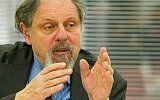Urs Schoettli: «Beijing Must Take Note of This New Climate»
Most of the time when Hong Kong was ruled by the British the colony did not have a democratic setup, Urs Schoettli, Consultant on Asian Affairs, writes on finews.asia.
In summer 1997 some 150 years of British rule came to an end and the former crown colony Hong Kong returned to the People’s Republic of China. Under the great reformer Deng Xiaoping Beijing agreed to give Hong Kong the status of a special Administrative Region (SAR). This solution sails under the formula «one country, two systems» meaning that Hong Kong is an unalienable part of the People’s Republic but can keep its legal system that had been set in place during British rule.
This arrangement is valid for fifty years, until 2047, when it can be renewed for another fifty years. Most of the time when Hong Kong was ruled by the British the colony did not have a democratic setup, although it was a functioning state of law.
When the date of departure came closer the British authorities introduced democratic structures in order to calm the nerves of the people who in the 1980s had become very fearful of the approaching Chinese takeover.
«Chris Patten, was a consummate politician who made a decisive contribution»
Significantly, while traditionally the governors of Hong Kong had been colorless functionaries, the last governor, Chris Patten, was a consummate politician who, although he was frequently vilified by Beijing, made a decisive contribution to a peaceful and orderly end of British colonial rule.
Following the Sino-British Joint Declaration of 1984, after the return to China Hong Kong got its own mini constitution, the Basic Law, which ensures that it keeps its economic, political and judicial systems as well as its unique way of life.
Amongst other privileges this implies that freedom of expression, political pluralism and open dissent, all of which are absent in China proper, are guaranteed in Hong Kong. At the head of the administration figures the Chief Executive who is chosen by a 1,200 member Election Committee. The legislative branch is formed by the Legislative Council (LegCo).
Half of its 70 members is chosen by functional constituencies representing different professional groups, while the other half is elected by general suffrage. Both in the case of the Chief Executive and of LegCo the electoral proceedings are carefully geared towards ensuring that Beijing friendly exponents are in control.
«The democratic camp is divided into several groups, sometimes because of personal rivalries»
Although there has been some easing in the direction of more democratic participation the democratic forces in Hong Kong are demanding the implementation of fully democratic rule.
Public opinion is divided into a number of camps. There are those who do not want to upset Beijing and who are afraid that political instability, which they see as unavoidable in a fully democratic system, will damage Hong Kong’s economy.
These forces of course have not only the backing of the masters in Beijing but also of most of the business community. In particular, the mighty tycoons are keen to avoid anything that could anger the mainland authorities, not least because they have substantial and lucrative business in the People’s Republic.
The democratic camp is divided into several groups, sometimes because of personal rivalries but largely because of differences in their political strategies. There are moderate democrats who advocate a step-by-step approach and, while expanding the space for democracy, want to avoid actions and provocations that could make Beijing loose face. Then there is the very vocal camp of pro-democracy activists who want the speedy implementation of full electoral democracy in Hong Kong.
Recently some even went as far as asking for the separation of Hong Kong from the mainland. For them the magical formula of «one country, two systems» has failed the Hong Kong people. Last Sunday the Hong Kong electorate was called for the regular renewal of LegCo.
«Hong Kong people demonstrated that they take great interest in their democratic rights»
In recent years there had been some hefty public protests and there was considerable interest how these would reflect themselves in the elections. Most importantly, the Hong Kong people demonstrated that they take great interest in their democratic rights.
The turnout for the LegCo election was the highest since the return to China. No less than 2,2 million people, almost sixty percent of the electorate, went to the ballot box.
More importantly, like in the previous LegCo in the new one, too, the democratic camp will have enough support to prevent the government from introducing any legislation that could curtail democratic freedoms.
This is crucial as the selection of the Chief Executive and the elections of candidates both within the functional constituencies and in the direct ballot are distorted in favor of the pro-Beijing camp.
«In 2014 Hong Kong had witnessed massive demonstrations in favor of full-fledged democracy»
Most interestingly, six candidates who advocate self-determination for Hong Kong won a seat in the new LegCo. In 2014 Hong Kong had witnessed massive demonstrations in favor of full-fledged democracy.
This impressive display of public dissatisfaction, however, did not have an impact on the official position of the authorities. There was, therefore, considerable interest how the radical democrats would fare in the election.
Although power in Hong Kong firmly remains in the hands of the establishment, Hong Kong people have demonstrated their dissatisfaction with the status quo. Short of interfering directly, Beijing must take note of this new climate and have its partners in Hong Kong prevent any escalation that can damage Hong Kong’s status as an international trading and financial center.
 Urs Schoettli, who lives in Tokyo and Mumbai, is an independent consultant on Asian affairs and member of the board at stars Foundation international, which provided us with this essay.
Urs Schoettli, who lives in Tokyo and Mumbai, is an independent consultant on Asian affairs and member of the board at stars Foundation international, which provided us with this essay.



























